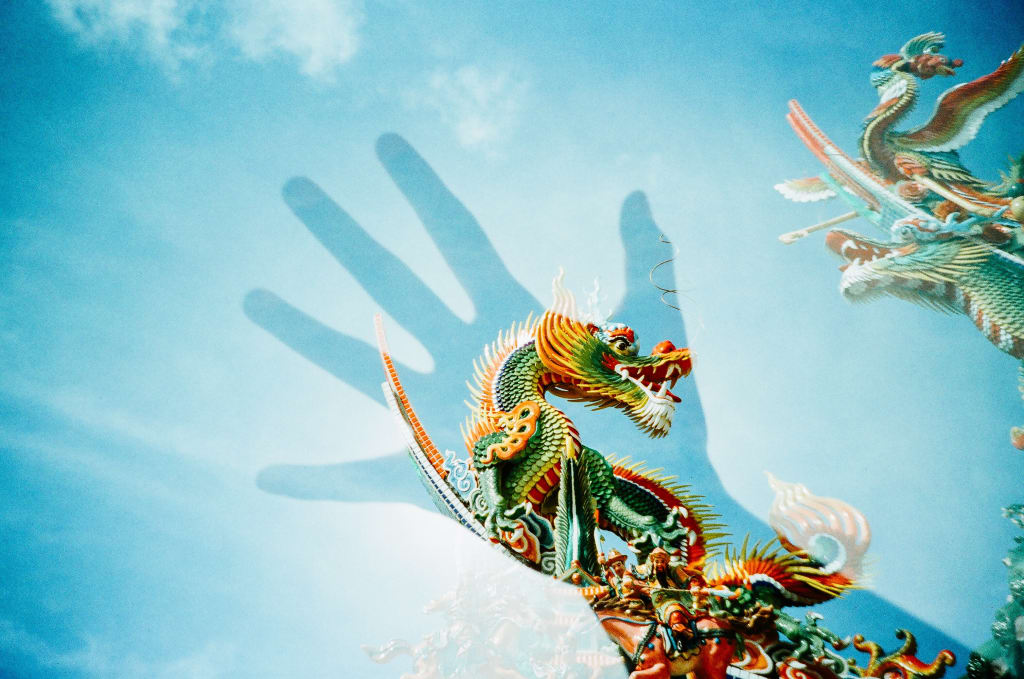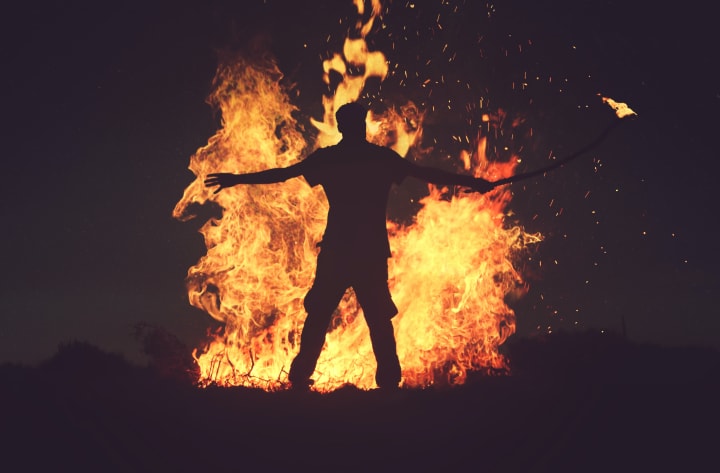
There weren't always dragons in the Valley.
Before They came, there was peace. The Yangtze Valley was a green and fertile plain, suitable for both crops and fodder. Its banks were well-fed by the swift-flowing river which gave the valley its name, and the livestock who lived in the Valley were fat, plentiful, and at peace—as were the people. We were all round-faced and content, content to live out the rest of our lives in this idyllic Valley we call home.
I remember those days well, for they were the happiest days of my youth. Every day after my lessons I would head out with the rest of the children, ostensibly for further, unguided "extra-curricular" lessons, but realistically to simply play. For us, the Valley was a wild and wondrous place; full of fields, nooks, crags, and crannies that a child can lose himself in. We spent most of our days playing childish games like catch-me-if-you-can and hide-and-seek; but our favorite sport, above all, was fishing. There was many a day where I returned home, sun-burnt and smiling, with a basket of fresh-caught fish in my hands. Mother would always frown to see me holding that basket, but Father would secretly be happy. He would instruct a servant to take the basket off of my hands, and in the same sentence order me, in mock-stern tones, to "change out of those filthy rags and join us for dinner." On the days when I returned home from fishing, the fish that I caught would always be served...
Ah yes, those were the good days, the grand days, the days before our Fall. When I think back on those days, two things, above all, stand out. The first was the sweet smell of wildflowers. This was how I knew that I was an unreliable narrator, that my recollections of the past may not be perfect. For the wildflowers, they emerged only during the spring, but in the perfect world of my memory they were always there; bright green shoots topped off with multi-colored petals, their fragrance redolent like honey-wine in the air. They were there as I caroused amongst the streams and the fields, heedless of the weather and the ever-changing seasons.
The second was my instructions. I was ceaselessly instructed—at times even warned—by my parents not to play with the other children, for they were of a different class than I was. They were the sons and daughters of farmers, while I was the eldest child of a lord. However, as I am wont to do, I ignored those instructions to a T. This was a big faux-pax. In the Valley, one's parents were respected, even venerated. I managed to get away with my disobedience, however. Part of it has got to do with my own personal charm, but most of it has got to do with how young I was. It's easy to get away with things when you're a spoiled young lordling of nine and not yet ten.
Now, however, I wish that I had listened to those instructions. Not for fear of committing any easily-smoothed-over cultural faux pax, but due to something far more horrible and less easily solved. I wish that I had stayed home more. I wish that I had spent more time with my aging Mother and Father.
For it was during one of those carefree days that the dragons came. When they did, the sky turned red, and the wildflowers burned...and so did the people. The smell of their burning flesh and the taste of their lingering death was like ashes in the back of my mouth.
-
"Ah-Kai! Ah-Kai, wake up!"
Someone was calling my name, and for one long, horrible moment I struggled to remember who or where I was. For one long, horrible moment I thought I was back, back in the battle. The Battle of the Burning Valley, that was what the singers called it. The singers are all liars. What happened in the Valley was no battle, it was cold-blooded slaughter. A handful of terrified peasants trying to fight off fire-breathing dragons, armed with nothing but pointed sticks. Yes, my people were brave. They tried to fight. They failed. They failed and they burned.
A calloused hand grabbed me by the shoulder and shook me roughly awake, and I saw with bleary eyes that the smoke in the room came not from the bodies of dead men, but from a naked torch guttering in the morning dark. The light of the torch revealed the gruff face of Sergeant Yi. When he saw that I was awake, he grunted once, then turned his attention to the person beside me.
"Five minutes, scholars!" Came a call from outside the tent. "Five minutes before we set off!"
There were groans and mumbles from all around me, but they were the groans of mumbles of resigned—even excited, men. For these were no ordinary men I was traveling with: they were pale-faced scholars, the future of our nation, off to take the Imperial Exam. And I was amongst them.
While the others went to relieve themselves or to wash the sleep from their eyes, I used the five minutes to collect my thoughts and my things. The latter was easy. I didn't own that many things. As a matter of fact I, aside from the clothes on my back, possessed only two other items. The first was a leather-bound diary, the diary I am scribbling on right now. For who to read, I do not yet know, for what I am attempting is treason, treason of the highest order. If I am caught, the punishment would be death—for me and my family. For the first time in my life, I find myself feeling glad that they are all dead.
The second of these items was an old sword, an heirloom that has been in my family for generations. Its cherry-wood hilt was flame-licked and blackened, its blade well-worn and knicked from many battles. But despite all its flaws, it was still a well-made sword. Its blade was still sharp despite decades of unuse, and its hilt was still sturdy after enduring the hottest of fires. It was a sword made to last. More than that, it was a sword made to kill.
Well before the five minutes are up, I am up and formed up outside, beneath the blue dawn of the still-brightening sky. Beside me are a loosely formed rank of still sleepy scholars, yawning primly into their hands, and in front of us are the grim-faced guards sent to escort us. As with every morning, roll-call ensued, and our names were called out one by one. When my name rang out in the stiff morning air, a flash of fire erupted behind my eyes, and I could hear, from deep beneath my mind's eye, the screams of my dying parents. The screams of my burning parents. I bit my tongue and uttered a brief and innocent-sounding word.
"Hong Kai!"
"Here!" I replied cheerily.
Yes, I was here, I thought, here to take the Imperial Examination, here to ace it and get one step closer to the dragons and their riders. See, that was the goal of all of the scholars gathered here today—all of the scholars except me, of course. After the attack and our subsequent colonization, the Mongol invaders had supplanted most of our laws. They had killed the Emperor and installed their own khan in his place. Then they revised our existing caste system, slotting all of the Han Chinese at the bottom and themselves at the very top. In the span of a single fortnight, the world as we knew it had been turned upside down.
But the invaders, perhaps in a bid to keep the peace, had left several of our systems intact. Chief among them were the Examinations. The Imperial Exam, as it colloquially is known, is designed to reward meritocracy, to give the people, no matter how lowborn, a chance to improve their standing. A citizen of our empire could, if he is smart and hardworking enough, through the Imperial Exam rise up the ranks and eventually become a noble in his own right. He could even, in time, become a dragonrider.
So that is my purpose today. That is why I studied day and night, why I am here today with the rest of the bright-eyed scholars. I'm here so I could be guided to the capital. I'm here so I could take the Imperial Exam.
As roll-call went on, I closed my eyes, pretending to be nothing but another sleepy scholar snatching a few seconds of shut-eye. Inwardly, however, I was focusing. Inwardly, I was remembering.
I remembered how, on that fateful day, the dragons came out of nowhere. I would say that they took us by surprise, but that wouldn't be entirely true. We had heard tales of dragons, of course: great snake-like beasts who flew in the air without wings, they who breathed out not air but steam, they who brought the rain and ended droughts. We had no idea if dragons were real, but that didn't stop us from believing in them. Many of my friends prayed to them, for their parents were farmers, and to farmers, the rain was an ever-benevolent friend. At first, I laughed off my friend's prayers as foolish superstition, until one of them brought up the fact that we nobles were just as superstitious ourselves.
"How so?" I remember asking, irritated.
"Well," my friend replied. "You guys worship dragons, too. I mean, the Emperor himself literally has a dragon as his personal seal!"
Having been trained at a young age in the noble skills of logic and rhetoric, I could see that his argument was watertight. I closed my mouth and gave him the win.
Ah, how I missed that friend. His name was Huang Jie, and his parents were shoemakers. He was amongst the first to die in the attack. He died screaming his mother's name.
Yes, we the Han People of the Yangtze Valley, worshipped the dragons. But we got one thing wrong. The dragons that showed up over the horizon weren't the wingless, benevolent creatures we prayed to. They were massive, monstrous creatures, with bat-like wings that blocked out the sky. And these dragons did not bring rain. They brought death. They did not breathe steam. They breathed fire. Gouts and gouts of fire. The flames that poured out of their mouths was as bright as the midday sun, and far more deadly than anything our armies could bring to bear.
"Alright, everybody's here. Let's move out!" came a call from the front, snapping me out of my reverie.
The soldiers mounted their horses, and the scholars their individual mules. I did the same, and as I mounted, my face was as placid as the Yangtze River on a lazy summer day. But inside, a torrent of emotions threatened to burst the banks. Chief amongst them was anger. Hot, hot anger. I bit my lip in an effort to turn the tide, and when that failed and my rioting emotions leaked out of my eyes, I turned my face towards the sun, that I might give the excuse of being blinded by the cold morning light.
Yes, I thought savagely as I blinked away my tears. Yes, Dear Mama and Papa. I have come to the capital, to take the Imperial Examinations like the rest of these hopeful traitors. But unlike them, I'm not doing it so I could get a cushy government job, so I could make friends with the winged beasts these Mongol savages call dragons.
As the steady clip-clopping of my mule took me ever closer to the tall towers of my invaded capital, my hands crept subconsciously to my sword. When my fingers found the blackened hilt, they thumbed it reverently, feverishly.
See, the guards and the scholars and the traitors, they got one thing wrong. I'm here to take the Imperial Examinations, yes, I'm going to ace it if I can. But after I pass the examinations, I'm not going to giddy-up and ride a dragon. Oh, no. Oh, no, no, no, no, no.
I'm not here to ride dragons, silly.
I'm here to kill dragons.







Comments (1)
I loved this Alvin. It is a very engaging and entertaining story. I think this would be brilliant as a continuous series.